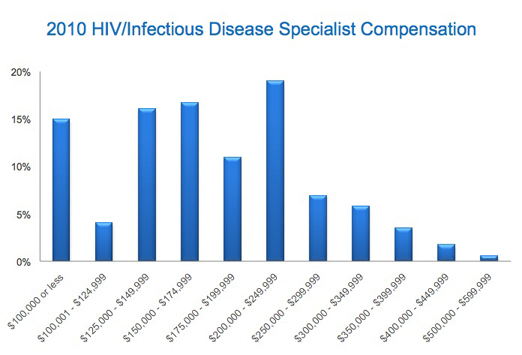An ongoing dialogue on HIV/AIDS, infectious diseases,
May 4th, 2011
How Much Do ID/HIV Doctors Get Paid?
 A long time ago, I was very close to becoming a Cardiologist. Really.
A long time ago, I was very close to becoming a Cardiologist. Really.
Even though my fascination with ID and microbiology started in medical school — and believe me, not much fascinated me in medical school — the fact that all the top residents in my program were going into Cardiology made me feel that somehow I should be doing this too. Plus, the guy who was Chief of Medicine was very influential.
When I came to my senses, and realized that I wanted to go into ID, there was a small problem — I had already matched in a Cardiology program. Hence I faced the tricky task of telling the program director, “Thank you very much for your kind offer, but I’ve decided I want to be an Infectious Diseases specialist.”
I remember his look of annoyance (understandable). It was soon replaced by one of disbelief. And then came a line I will never forget:
At least your motivation isn’t financial — ID doctors get paid s–t.
All of this came back to me when I read this fascinating survey over on Medscape on what we doctors get paid.
Some of the interesting results:
- Yes, ID specialists (median of $174,750/year) are at the lower end of the specialist scale. Other bottom feeders? Pediatricians (it’s a family thing), Rheumatology, Endocrinology, Primary Care …
- And the program director at my cardiology-fellowship-that-never-happened was right: Cardiologists are the third-highest-paid physicians (after orthopedic surgeons and radiologists), with a median income of $325,000. 20% of Cardiologists report making more than $500,000, while almost this many ID/HIV docs get < 100,000.
- However, despite this disparity, a higher proportion of ID docs (55%) than Cardiologists (45%) report they were fairly compensated. Is that because ID is the most fascinating field in medicine? And that an endocarditis case is surely more interesting than the simple plumbing they generally care for? (That was a joke. Some of my best friends are cardiologists.)
- Weird disconnect between geographic cost of living and salaries, with the lowest pay coming in the most expensive places to live. This is of course the complete opposite of salaries in business, banking, and law. So if you want your doctor’s pay to go further, don’t live in California or Washington/NYC/Boston!
Of course, as we tell our kids, when choosing a career, it’s not about being rich — it’s about being happy.
But if you want to be both rich and happy, the specialty-of-choice is clearly Dermatology — median annual income is nearly $300,000, and a whopping 93% said they’d choose the same specialty again, the highest of all the fields surveyed.
Acne treatment never looked so good.


It’s absolutely crazy the tremendous inequity in how people get paid in this country. Dermatology???!!!! Ok, I supposed looking your best is really important, perhaps more important than finding a cure for cancer or treating people with HIV… The important, true health related stuff dermatologists do don’t really make them much money. It’s the cosmetic stuff that really brings in the bucks. Kind of makes me think of other, troubling comparisons that exist in the world. Consider the compensation that even the average hedge fund managers makes vs. what our best teachers get paid. Or how about our best social workers who spend most of their time helping the most troubled members of our society cope. Is it really possible that the value of what they do is worth exponentially less (I mean a 1000 times less) than the money that’s made by senior executives of Exxon Mobil. Ayn Rand might argue – YES – but I don’t think so.
Yes, it’s because ID is the most fascinating field in medicine!
I spent years as an ID doc and hospital epidemiologist trying to get the cardiologists moved to the surgery section at my hospital. You get paid for procedures, not thought– which should not be news to this readership. Once I tried to charge for a gram stain what the pulmonologist got for a bronch but it didn’t fly. Oh well.
A recent article in Archives of Internal Medicine (170:1728, 2010) looked at compensation per hours worked and came to the same conclusion. ID was still near the bottom.
Dr Sax points out a very crucial aspect ID practice,I am a fellow and lets say its encouraging news ( of course thats a joke). But I agree, its the most fascinating field.
I always joke that the proceduralists are paid thousands of dollars to create a problem, and I get a couple of hundred (if I am lucky) to fix it up for them. I love what I do, but it is definitely interesting how certain skills are valued so much higher than others
As a 3rd year medical student interested in ID, my question is: would anyone of you guys do it all over again despite the income and is there/ will there continue to be a demand for ID specialists?